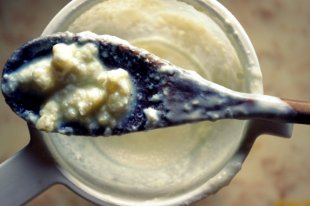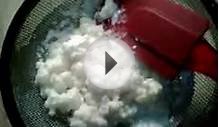
 One of my favorite things about milk kefir is the continual growth of the grains. It gives you the option of making as much kefir as you could want, sharing the kefir love with friends, or using those kefir grains for something totally different, which we will be exploring later on in this series.
One of my favorite things about milk kefir is the continual growth of the grains. It gives you the option of making as much kefir as you could want, sharing the kefir love with friends, or using those kefir grains for something totally different, which we will be exploring later on in this series.
While the grains can be perfectly healthy without multiplying, I love the encouragement it gives me when I see them multiplying – they just seem happy.
But it’s not always as simple as keep on feeding them. Last time we explored how you need to increase the volume of milk you culture as your grains increase. This time lets explore a few other tips that I have found helpful in encouraging those grains to grow.
1. Agitate them.
Don’t annoy them, shake them. Rosalyn, a contributor here on the blog and a Customer Service Rep for CFH, gave me this little tip and it really did help. Sometimes the grains can get stagnant either at the top of the culturing jar or the bottom. Giving the jar a gentle shake every now and again through the culturing process will allow the grains access to the milk in other areas of the jar.
Fresh milk equals more food for the grains to feast on, which makes them happy and want to multiply.
2. Keep them cozy and consistent.
One of the biggest struggles I have had is keeping my milk kefir grains at a consistent temperature in the winter. If your home has cold swings, say at night or between stoking a wood stove, then you’ll want to find a place to keep them that is as insulated as possible. Wrap them in a towel or keep them near a heat source, but not too close. Temperatures over 90 degrees can also negatively effect milk kefir.
3. Keep them small.
When you first receive your milk kefir grains they are very small. As they rehydrate and gain vigor they usually grow in size and in number. If you find that your kefir grains are getting larger but are not multiplying, you could try very gently breaking them apart by rubbing them between your fingers. This increases the surface area which increases their ability to take in nourishment from the milk, which may result in grains that multiply.
YOU MIGHT ALSO LIKE












